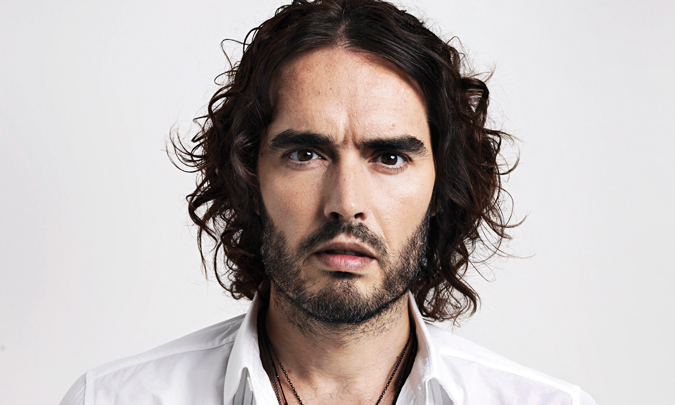At the very least, Russell Brand is an enigma. He is tough to pin down and affable as he is opinionated. He’s often an instigator, such as when he recently showed up at Fox News headquarters to object to his interview being canceled with a high profile interviewer. After being escorted off the premises by security he finished his speech about the travails of fighting the news behemoth on camera, in his car, as he left. He has been referred to as a champagne-socialist, which, considering his high earning potential in recent years and his increasingly leftist leanings, is not far off the mark. Yet, he presents his points with a vigor and believability rarely seen in recent times. These days, he does seem to be rebranding himself – pun absolutely intended – as a bit of a political activist. With the release of his new book in October of this year, we check in to see what motivates him lately.
The initial reaction, after his breakout role in the 2008 movie Forgetting Sarah Marshall, a role which he would later go on to recreate for 2010’s Get Him To The Greek, was that he was a straw man, and not to be taken seriously. A bright but ultimately feckless man when it comes to the larger concerns of a modern world. But Russell seems intent on building a media empire. One based on, it seems thus far, honest reporting, independent thought, and a willingness to buck the mainstream trends of an increasingly binary global conversation.
In many ways he seems to be an answer to the voiceless generation X (though arguably adopted as spokesperson for generation Y) before him. I say voiceless, not for a lack of ability to garner one, but rather for the apathy at which most X’ers approach most things political. They seem at best, too savvy to play along with a game that they have already been pushed out of, and at worst – too self-involved to care. For his part, Brand, with his lothario with an occasional heart of gold demeanor, and razor-sharp wit, seems to be a character in which his generation finds an unwitting spokesman.
In excerpts from his new book, Revolution, released in October of this year, he talked about the growing disparity in global wealth. He has regularly pried apart the clenched and corrupt fists of American politics in order to peer inside the machine. One striking point of note, he said that one key element to a more even world environment was, “No more private security for the wealthy and the powerful. (An) economist argued in 2005 that roughly one in four Americans are employed to guard in various forms the wealth of the rich. So if you want to get rid of rich and poor, get rid of guard labor.” By this token, no wonder so many feel oppressed.
“This may be the point in the article where you start shouting the word “hypocrite.” Don’t think I’m unaware of the inevitability of such a charge. I know, I know. I’m rich, I’m famous, I have money, I have had private security on and off for years. There is no doubt that I as much as anyone have to change. Revolution is change. I believe in change, personal change most of all. Know, too, that I have seen what fame and fortune have to offer and I know it’s not the answer. Of course, I have to change as an individual and part of that will be sharing wealth, though without systemic change, that will be a sweet, futile gesture.’’
It may be letting himself off a bit easy to say that without systemic change, the giving of his money to causes would be futile, but he’s not necessarily wrong. It would be easy enough to see how many times humanitarian efforts and capital have gone to graft given a lack of transparency or adequate measures to get help to the people they intend to help. That said, there will most certainly come the point where Russell will have to put his money where his mouth is. He goes on to cite more of the economic disparity when speaking again about security.
“These systems can be very expensive. America employs more private security guards than high-school teachers. States and countries with high inequality tend to hire proportionally more guard labor. If you’ve ever spent time in a radically unequal city in South Africa, you’ll see that both the rich and the poor live surrounded by private security contractors, barbed wire and electrified fencing. Some people have nice prison cages, and others have not so nice ones.”
He continues, “Companies spend a lot of money protecting their CEOs. Oracle spent USD 4.6m. One casino empire – the Las Vegas Sands – spent USD 2.45m. This money isn’t security so much as it is designed to wall these people off from the society they rule, so they never have to interact with normal people under circumstances they may not control. If you just got rid of this security, these people would be a lot less willing to ruthlessly prey on society.”
“One of the most remarkable things you learn when you work in a position of political influence is just how much titles separate the wealthy and the politicians from citizens. Ordinary people will use a title before addressing someone, and that immediately makes that ordinary person a supplicant, and the titled one, a person of influence. Or if both have titles, then there’s upper-class solidarity. Rank, hierarchy, these are designed to create a structure whereby power is shaped in the very act of greeting someone.”
For a man who seeks to break down some of the social constructs that have traditionally separated the rich from the poor, there is certainly a lot of work to do. His new book, Revolution, is just one way in which he seeks to get his message out to the common people.
Russell Brand’s new book, Revolution, is out now and available online and at a bookstore near you!








